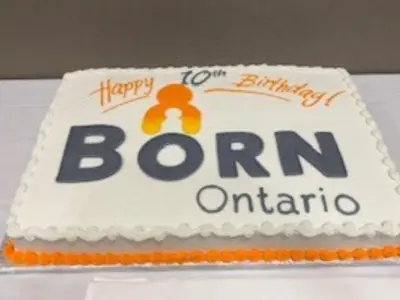Our Story
1980s-1990s
Foundations and Early Growth
1980s
BORN Ontario’s origins can be traced to the Perinatal Education Program of Eastern Ontario (PEPEO), led by Dr. Patricia Niday. A pioneer in using data to improve obstetrical and neonatal care, Dr. Niday encouraged hospitals to submit monthly maternal and newborn data to Ottawa Public Health for analysis and reporting—a foundational step in regional data sharing.
Late 1990s
PEPEO evolved into the Perinatal Partnership Program of Eastern and Southeastern Ontario (PPPESO), as more hospitals recognized the value of pooling data to monitor outcomes and drive improvements in care.
Working with other Ontario perinatal networks, PPPESO successfully advocated for provincial funding to expand the database, which was renamed the Niday Perinatal Database in honour of Dr. Niday’s visionary leadership.
2003-2006
Expanding the Network and Scope
2003
The Child Health Network and Greater Toronto Area (GTA) hospitals joined the data system—significantly expanding its reach to include approximately 50% of all births in Ontario. At the time, the database was still housed within the Perinatal Partnership Program of Eastern and Southeastern Ontario (PPPESO) and the Children's Hospital of Eastern Ontario (CHEO), and it was renamed the Ontario Perinatal Surveillance System (OPSS).
2004
OPSS developed the Niday NICU module, enhancing data collection for neonatal intensive care units.
2005
OPSS extended its partnerships and data collection efforts.
The system laid groundwork for future integration of multiple maternal-child health data sources, including prenatal screening and midwifery data.
2006
The government's first provincial report on perinatal care was produced.
A Ministry of Health and Long-Term Care reorganization led to the formation of the Maternal Child Health Strategy Division. Responsible for a number of maternal child data sources in the province, the division quickly recognized the value of integrating data within an appropriate privacy environment to facilitate and improve care.
The Ministry of Health and Long-Term Care directed OPSS to amalgamate data from clinical programs: prenatal screening, the Fetal Alert Network (for congenital anomalies), the Ontario Midwifery Program, the Niday perinatal and NICU modules, and Newborn Screening Ontario.
2007-2012
Becoming BORN Ontario
2007
OPSS was actively presenting findings and engaging with hospitals, midwives, and public health units to prepare for the integration of multiple data sources into a provincial registry.
2008
A quality audit of the Niday Perinatal Database was conducted to assess data reliability and completeness across Ontario hospitals.
Recommendations from the audit helped improve data quality and laid the foundation for the future BORN Information System.
2009
With new provincial funding, the Ontario Perinatal Surveillance System (OPSS) was rebranded as Better Outcomes Registry & Network (BORN) Ontario—reflecting a broader mandate to support maternal and child health through high-quality data.
Work began on the BORN Information System - an integrated platform to support evidence-informed care across Ontario.
2010
BORN continued development of the BORN Information System.
2011
BORN achieved registry status under Ontario’s Personal Health Information Privacy Act (PHIPA).
2012
The BORN Information System officially launched.
In November 2012, BORN’s Maternal Newborn Dashboard went live, offering hospitals performance feedback on key indicators.
2013-2019
Broadening Data Collection and Partnerships
2013
Data on in-vitro fertilization (IVF) cycles from fertility clinics across Ontario was incorporated into the BORN Information System via the Canadian Assisted Reproductive Technology Register (CARTR Plus)
The BORN Data Quality Framework was implemented.
2014
BORN convened a Prenatal Screening Quality Assurance Committee.
BORN created a Data Quality Team.
2015
In partnership with the Ministry of Children, Community and Social Services (MCCSS), BORN expanded its data collection from the electronic medical records of primary care sites for well-baby well-child visits from birth to five years of age.
In December of 2015, the Ministry of Health and Long-Term Care began funding one IVF per person in Ontario through the Ontario Fertility Program (OFP). As part of their agreement to provide funded cycles, Ontario IVF Medical Directors agreed to allow the Ministry to monitor outcomes of funded IVF cycles through CARTR Plus.
In partnership with the CHEO Autism Program, BORN expanded the BIS to collect Child and Adolescent Needs and Strengths – Autism Spectrum Profile (CANS ASP©) data from 13 lead Applied Behaviour Analysis (ABA) agencies across the province.
2016
A Prenatal Screening Strategy Task Force convened by the Provincial Council for Maternal and Child Health (PCMCH) recommended the creation of a provincial prenatal screening program.
As Non-Invasive Prenatal Testing (NIPT) - also called cffDNA , screening was patriated in Ontario, labs started contributing data to the BIS. This data is linked to pregnancy outcomes to determine the performance of NIPT in this population.
2017
On April 25, 2017, BORN celebrated 1,000,000 babies in the registry!
The Ministry of Health and Long-Term Care (MOHLTC) announced the creation of a provincial prenatal screening program - Prenatal Screening Ontario (PSO). PSO is housed within BORN as its work will be driven by BORN data.
2018
Prenatal Screening Ontario launched a toll-free prenatal screening information line. A certified genetic counsellor is available to answer questions from patients, providers, and other stakeholders (e.g. lab personnel).
2019
BORN launched a new encounter to collect cytogenetic data results from both prenatal and neonatal testing. This allows PSO to understand precisely how well our system works in screening for Down syndrome, trisomy 18 and trisomy 13.
Researchers from BORN, the Ottawa Hospital, CHEO, and the University of Ottawa conducted one of the largest studies to date on the effect of cannabis use during pregnancy; findings were published in JAMA in June 2019.
The Nuchal Translucency Quality Assurance (NTQA) program was implemented to support
sonographers in their practice.
2020-2022
Responding to Emerging Health Challenges
2020
BORN coordinated data collection for cases of COVID-19 in pregnant individuals admitted to Ontario hospitals or cared for by a midwife.
BORN participated in the Maternal-Neonatal COVID-19 Task Force responsible for developing provincial recommendations to guide care.
In June 2020 BORN upgraded the BORN Information System (BIS), moving it
to a cloud-based infrastructure.
2021
BORN launched a portfolio dedicated to Health Equity, Diversity, and Inclusion.
In March 2021, BORN launched the vaginal birth after cesarean (VBAC) Quality Standard Report (to support the Quality Standard developed by Health Quality Ontario and the Provincial Council for Maternal and Child Health.
2022
BORN launched the Safe Administration of Oxytocin Report (in support of the Provincial Council for Maternal and Child Health Safe Administration of Oxytocin Guidelines)
In May 2022, the first Canadian, peer-reviewed study on COVID-19 during pregnancy was published in the Journal of the American Medical Association (JAMA). BORN was part of this study - contributing Ontario data. The study showed that pregnant individuals with COVID-19 were at greater risk of being hospitalized, being admitted to intensive care units (ICUs) and experiencing an early birth.
Researchers linked BORN data with data from Statistics Canada and the province's immunization database and found that COVID-19 vaccination during pregnancy was not significantly associated with an increased risk of adverse peripartum outcomes. The results appeared in JAMA in March, 2022.
2023-2025
Innovation, Resilience, and New Initiatives
2023
BORN launched the Midwifery Invoicing System (MIS) Rebuild Project.
BORN was impacted by a cybersecurity breach.
In March 2023, BORN released its final surveillance report on Pregnancy and COVID-19 in Ontario.
2024
New data elements related to Respiratory Syncytial Virus (RSV) protection were integrated into the BORN Information System in October, 2024 (in support of the Ministry of Health's expanded RSV prevention program for the 2024-25 season).
BORN launched the IQ Pod, a new team dedicated to cultivating, supporting and growing a culture of data and information quality improvement at BORN.
2025
BORN launched the Paediatric Diabetes Initiative - providing a system to collect and store information and share insights about children and youth living with diabetes in Ontario who receive care from a Paediatric Diabetes Education Program.











